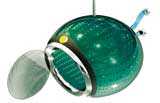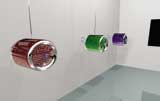
santos dumontMini clothes washersantos dumont
A light, small and cheap clothes washer, which can be carried in the trunk of a car, is the dream of many consumers. If, besides being portable, it can be fitted onto the wall or ceiling and work as a dryer, better still. This is the proposal of a mini clothes washer that is in the final stage of development by designers Marcelo Monteiro and Ricardo Mondella, from a company called Santos Dumont, and has as its main innovations the creation of an annular electric motor and a remote control.
Funded by FAPESP’s the Small Business Innovation Research Program (PIPE in the Portuguese acronym), the mini clothes washer project, which started in May 2004 as a development of a project called Both Directions, which provided for the creation of a washing machine with a spherical laundry basket to spin simultaneously in the vertical and horizontal directions, with the assistance of a new motor. Both Directions was carried out between 1998 and 2003, partly sponsored by Multibrás, a manufacturer of domestic appliances that include the Brastemp and Cônsul brands “The fact that the basket rotates in both directions increases the attrition between the water and the clothes, speeding up the washing process, with a consequent reduction in the consumption of water and electricity”, says Monteiro, a graduate in industrial design from the Armando Álvares Penteado Foundation (Faap). The company financed the construction of the first prototype and the maintenance of the international patents for the spherical washing machine.
Spherical drum
To put into practice the innovations suggested for the washing machine, several solutions were created during the construction of the prototype. One of the questions raised during the process was how to make the spherical basket spin in both directions, that is to say, around two axes simultaneously, without the assistance of gearing. To solve this, the idea arose of incorporating the new motor directly into the surface of the tank and of the laundry basket.
The concept of the annular electric motor is based on a rotor, a spinning mechanism in the form of a ring, made up of permanent magnets. To ensure its waterproofing and the insulation of the electrical current, encapsulation was planned or the injection of the parts of the engine during the manufacturing process.
With the first stage of development concluded, Monteiro decided to carry on with the project. Other ideas were added to the original idea of the annular motor, such as a chip to activate the product only at the time of sale, which acts as an instrument to prevent cargo robbery, as well as making it possible for the manufacturer to map the purchase and sale of the product, and a remote control with a timer, which can be connected to the washing machine or disconnected.
A single remote control, one of the most expensive components of the new product, can be used with two washing machines. Having two machines facilitates the life of people who do not like or who cannot mix items of clothing, such as health professionals who wash their working clothes separately. Another possibility is the possibility of the washing machine having a dual role and also working as a clothes dryer. For this to happen, at the end of the washing cycle, you just have to fit on an accessory similar to a print cartridge that has a resistance and a little fan responsible for injecting hot air into the tank. Products for laundry hygiene, such as soap, fabric softener and bleach, can also be manufactured in the shape of a cartridge or capsule with suitable measure for a good wash. Accordingly, the consumer will be able to reload the product in the desired quantity. For the time being, there is not yet any forecast as to when the mini clothes washer will be on the market, but negotiations to this effect are now being carried out with some companies from the sector.

santos dumontRing-shaped electric motor is the main innovation of the mini clothes washersantos dumont
Lower consumption
The mini clothes washer was originally conceived to handle 3.5 kilos of clothes. But it can be adapted to wash up to 8 kilos. “The concept is the same, the size doesn’t matter”, Monteiro says. The choice of the mini occurred for a question of marketing. In the large Brazilian cities and abroad, the number of people who live on their own is getting bigger and bigger, in increasingly smaller dwellings. Accordingly, a potential market for a washing machine with small dimensions that reduces by 40% the weight, size and volume of the present-day washing machines and consumes less water and electricity. The conventional 5-kilo washing machines consume an average of 230 liters of water in the washing process. With the mini, this consumption is reduced by about 30%.
“One of the great advantages of the project refers to the simplicity in construction brought about by the new concept of an annular electric motor”, Monteiro says. With this, almost, all the mechanical components needed for moving the basket are eliminated, such as the belts, pulleys and transmissions, making the technical assistance extremely simple and the product 90% recyclable. The conception of the motor also eliminates the axle with blades used in the conventional washing machines, which often harms the garments and reduces the useful life of the cloth.
Because of the weight of the mini, about 9 kilos in all, a new concept of suspension was created for the washing machine, similar to a cushion, which can perform simultaneously the function of the springs, the counterweights and the feet. Conceived to be inflatable and made in materials like polymer or rubber, the cushion may also act as a recipient for the water at the end of the washing. The water passes through a filter in the cushion, where it remains until being reused.
Varied shapes
The small quantity of mechanical components simplifies manufacture and considerably reduces the final cost of the product by about 30% to 35%. With this, the price for the consumer would fall a lot and come close to the sales price of the semiautomatic washing machines, the cheap two-tub washing machines. In Brazil, the market for semiautomatic washing machines is almost twice as large as the market for the automatic ones, around 1.1 million machines a year. This is one of the market niches of interest for the mini clothes washer, which can be manufactured both in a cylindrical and a spherical format. “It depends on the option of the manufacturer”, Monteiro says. “One of the advantages of the project is making possible a large variety of shapes, colors and materials.”
The project involves not only a new concept in manufacturing, but in marketing as well. One of the business models proposed is to draw together the two ends of the productive chain. “The retail sector, if it wishes, does not have to buy, transport and store the product, it simply simulates the sale and advises the manufacturer, which invoices it and delivers it straight to the consumer’s house”, says the researcher. This relationship is possible because of the simplicity of the product’s construction.
The set of the mini’s technical and conceptual innovations extends to the conventional washing and drying machines for 4, 5 and 6 kilos and to various other domestic appliances, increasing the product’s commercial potential, including as far as concerns the export market. That is why they are already protected by Brazilian and foreign patents in the United States, Europe, Japan, Canada, Mexico, China and India.
The innovations connected with the project go further, including the possibility of creating an electronic stock exchange for industrially manufactured products, on which shares in products would be traded and exchange, and no longer in companies. “These shares could be directly linked to the purchase of the product or be available before its launch, thus making it possible for companies to raise funds for its development”, Monteiro says. A new international patent is already on the way to guarantee future trading on the stock exchanges.
The Project
Mini clothes washer (nº 03/13142-6); Modality Small Business Innovation Research Program (PIPE); Coordinator Marcelo Monteiro – Santos Dumont Criação e Design; Investment R$ 219,691.00

